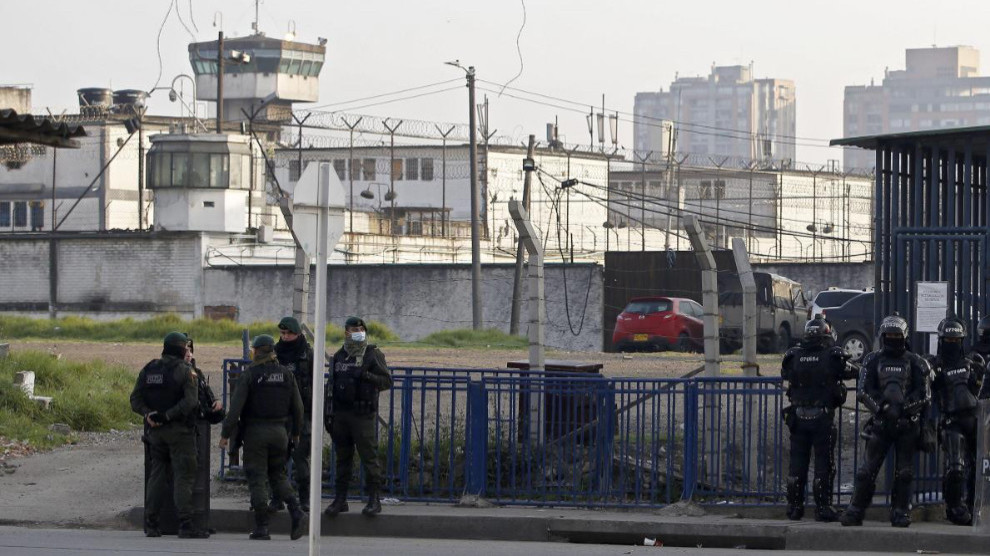UN calls on governments to reduce the number of prisoners
Authorities should examine ways to release those particularly vulnerable to COVID-19, among them older detainees and those who are sick, as well as low-risk offenders, said UN’s Bachelet.
Authorities should examine ways to release those particularly vulnerable to COVID-19, among them older detainees and those who are sick, as well as low-risk offenders, said UN’s Bachelet.

United Nations High Commissioner for Human Rights Michelle Bachelet has called on governments to take urgent action to protect the health and safety of people in detention and other closed facilities, as part of overall efforts to contain the COVID-19 pandemic.
“Covid-19 has begun to strike prisons, jails and immigration detention centres, as well as residential care homes and psychiatric hospitals, and risks rampaging through such institutions’ extremely vulnerable populations,” said Bachelet on Wednesday.
“In many countries, detention facilities are overcrowded, in some cases dangerously so. People are often held in unhygienic conditions and health services are inadequate or even non-existent. Physical distancing and self-isolation in such conditions are practically impossible,” she added.
“Governments are facing huge demands on resources in this crisis and are having to take difficult decisions. But I urge them not to forget those behind bars, or those confined in places such as closed mental health facilities, nursing homes and orphanages, because the consequences of neglecting them are potentially catastrophic,” the High Commissioner said.
“It is vital that governments should address the situation of detained people in their crisis planning to protect detainees, staff, visitors and of course wider society,” she added.
“With outbreaks of the disease, and an increasing number of deaths, already reported in prisons and other institutions in an expanding number of countries, authorities should act now to prevent further loss of life among detainees and staff,” Bachelet said.
The High Commissioner urged governments and relevant authorities to work quickly to reduce the number of people in detention, noting several countries have already undertaken some positive actions. Authorities should examine ways to release those particularly vulnerable to COVID-19, among them older detainees and those who are sick, as well as low-risk offenders. They should also continue to provide for the specific health-care requirements of women prisoners, including those who are pregnant, as well as those of inmates with disabilities and of juvenile detainees.
“Now, more than ever, governments should release every person detained without sufficient legal basis, including political prisoners and others detained simply for expressing critical or dissenting views,” Bachelet stressed.
When people are released, they should be medically screened and measures taken to ensure that if needed they receive care and proper follow-up, including health monitoring.
“Under international human rights law, States have an obligation to take steps to prevent foreseeable threats to public health and have a duty to ensure that all who need vital medical care can receive it,” Bachelet said.
For those in detention, the State has a particular duty to protect inmates’ physical and mental health and well-being, as set out by the UN Standard Minimum Rules for the Treatment of Prisoners (also known as the Nelson Mandela Rules).
Measures taken amid a health crisis should not undermine the fundamental rights of detained people, including their rights to adequate food and water. Safeguards against ill-treatment of people in custody, including access to a lawyer and doctor, should also be fully respected.
“Restrictions on visits to closed institutions may be required to help prevent COVID-19 outbreaks, but such steps need to be introduced in a transparent way and communicated clearly to those affected. Suddenly halting contact with the outside world risks aggravating what may be tense, difficult and potentially dangerous situations,” Bachelet said. She noted examples of alternative measures taken in some countries, such as setting up expanded videoconferencing, allowing increased phone calls with family members and permitting email.
“COVID-19 poses a huge challenge to the whole of society, as governments take steps to enforce physical distancing. It is vital such measures are upheld, but I am deeply concerned that some countries are threatening to impose prison sentences for those who fail to obey. This is likely to exacerbate the grave situation in prisons and do little to halt the disease’s spread,” Bachelet warned.
“Imprisonment should be a measure of last resort, particularly during this crisis.”
The UN Human Rights Office and the World Health Organization are due this week to issue an interim guidance paper - COVID 19: Focus on persons deprived of their liberty - which will contain key messages and actions for other UN agencies, governments and relevant authorities, national human rights institutions, and civil society